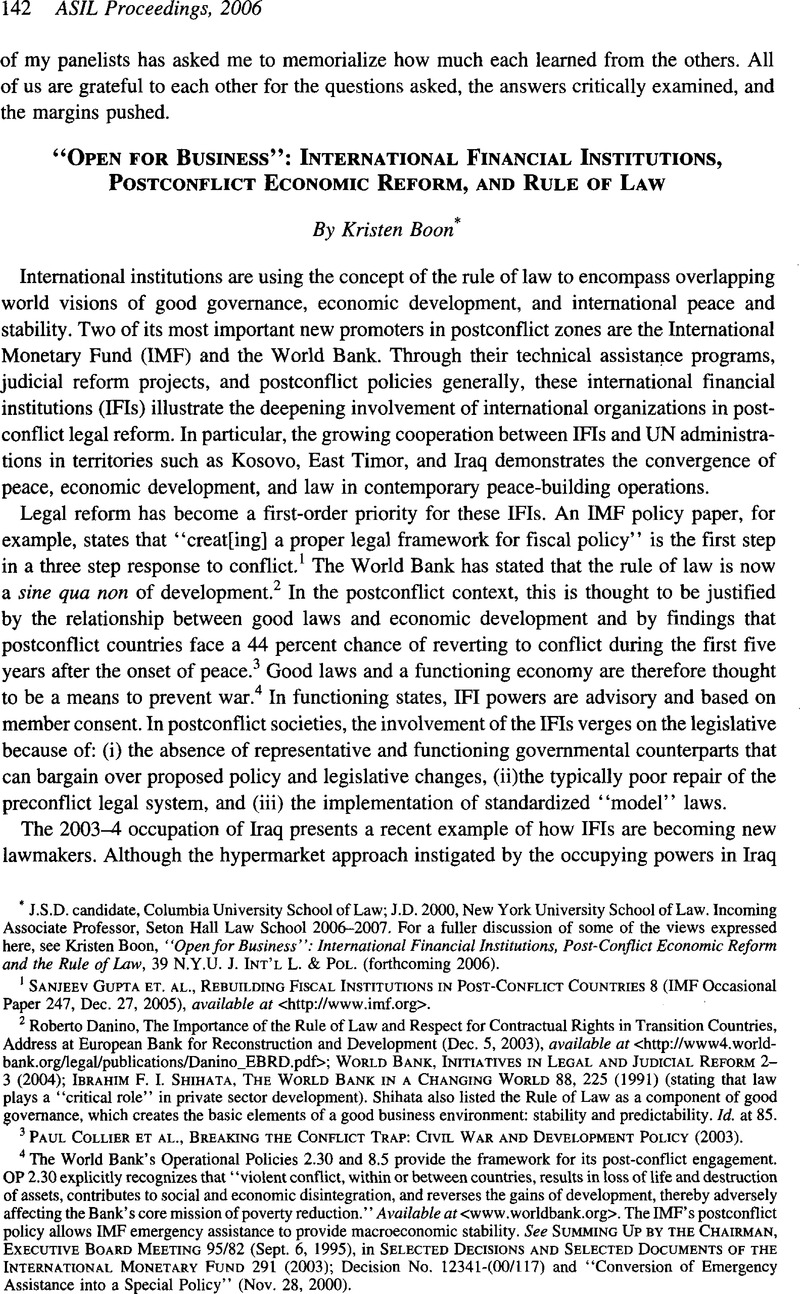Published online by Cambridge University Press: 28 February 2017

1 Sanjeev Gupta Et. Al., Rebuilding Fiscal Institutions in Post-Conflict Countries 8 (IMF Occasional Paper 247, Dec. 27, 2005), available at <http://www.imf.org>.
2 Roberto Danino, The Importance of the Rule of Law and Respect for Contractual Rights in Transition Countries, Address at European Bank for Reconstruction and Development (Dec. 5, 2003), available at <http://www4.world-bank.org/legal/publications/Danino_Ebrd.pdf>; World Bank, Initiatives in Legal and Judicial Reform 2-3 (2004); Ibrahim F. I. Shihata, The World Bank in A Changing World 88, 225 (1991) (stating that law plays a “critical role” in private sector development). Shihata also listed the Rule of Law as a component of good governance, which creates the basic elements of a good business environment: stability and predictability. Id. at 85.
3 Paul Collier Et Al., Breaking the Conflict Trap: Civil War and Development Policy (2003).
4 The World Bank’s Operational Policies 2.30 and 8.5 provide the framework for its post-conflict engagement. OP 2.30 explicitly recognizes that “violent conflict, within or between countries, results in loss of life and destruction of assets, contributes to social and economic disintegration, and reverses the gains of development, thereby adversely affecting the Bank’s core mission of poverty reduction.” Available at <www.worldbank.org>. The IMF’s postconflict policy allows Imf emergency assistance to provide macroeconomic stability. See Summing Up by the Chairman, Executive Board Meeting 95/82 (Sept. 6, 1995), in Selected Decisions and Selected Documents of the International Monetary Fund 291 (2003); Decision No. 12341-(00/117) and “Conversion of Emergency Assistance into a Special Policy” (Nov. 28, 2000).
5 Resolution 1483, for example, “calls upon the international financial institutions to assist the people of Iraq in the reconstruction and development of their economy?”, and Resolution 1511 “appeals to Member States and the international financial institutions to strengthen their efforts to assist the people of Iraq in the reconstruction and development of their economy.”
6 Derek Gilman, Deputy General Counsel (Commercial Law Reform) for the CPA, identified the following steps in the CPA’s legislative process: (1) identify need (i.e., private- sector development, request from Iraqis); (2) prioritize need (i.e., mission critical, very important, important); (3) identify relevant existing Iraqi law; (4) assign counsel to review existing Iraqi law and identify relevant international standards; (5) coordinate with Iraqis (government officials, and, where possible, the Iraqi public sector) and provide Arabic summaries or point papers (where possible); (6) international coordination: submit drafts of regulations and ensure approval of representatives of Australia, Imf, United Kingdom, United States, and World Bank; (7) revise draft based on comments; (8) translate draft regulation into Arabic; (9) present regulation to Ambassador L. Paul Bremer for approval; (10) present English and Arabic versions to IGC for approval; (11) further revise drafts if comments from IGC, and after seeking advice from specialized agencies, in particular, the international financial institutions and the coalition governments; (12) obtain signature of Ambassador Bremer for entry into force; (13) publish regulation on website; and (14) publish regulation in Iraq’s official gazette.
7 Interview with Derek Gilman (Feb. 19, 2005).
8 See also International Monetary Fund, Background Paper for Mfd Technical Assistance to Recent Post-Conflict Countries 16-17 (2004), available at <http://www.imf.org/external/np/ta/2005/eng/022805a.pdf>, which noted that:
[d]uring the period 2003/04, MFD provided considerable TA in the form of policy papers on a number of key issues, including central bank institutional reform, financial sector legislation, and currency reform to the Coalition Provisional Authority and the CBI. The first MFD mission, in July 2004, was largely of a diagnostic nature. New financial sector legislation. LEG and MFD prepared various versions of a new CBI Law, which was enacted in March 2004.
This report indicates that the Imf drafted banking and other financial laws in other post-conflict contexts. See id. at 6 (stating that the MDF and LEG units of the Fund prepared the draft banking legislation in Afghanistan that was enacted in July 2003).
9 Gold, Joseph, Interpretation: The IMF and International Law 474 (1996)Google Scholar. Interview with Ross Leckow, Assistant General Counsel, (IMF, Feb 25, 2005). The IMF makes independent findings of statehood for example, and while it might take into account the United Nations’ position, the Fund considers it as evidence, and not as a legally binding fact. See also Shihata, supra note 2.
10 See Alvarez, Jose, Interpretation of the Charter in the Political Organs of the United Nations, in Law, State and International Legal Order: Essays in Honor of Hans Kelsen 274 (Engel, Salo ed., 1964)Google Scholar.
11 Waldron, Jeremy: Is the Rule of Law an Essentially Contested Concept (in Florida)? 22 Law & Phil. 137 (2002)Google Scholar.